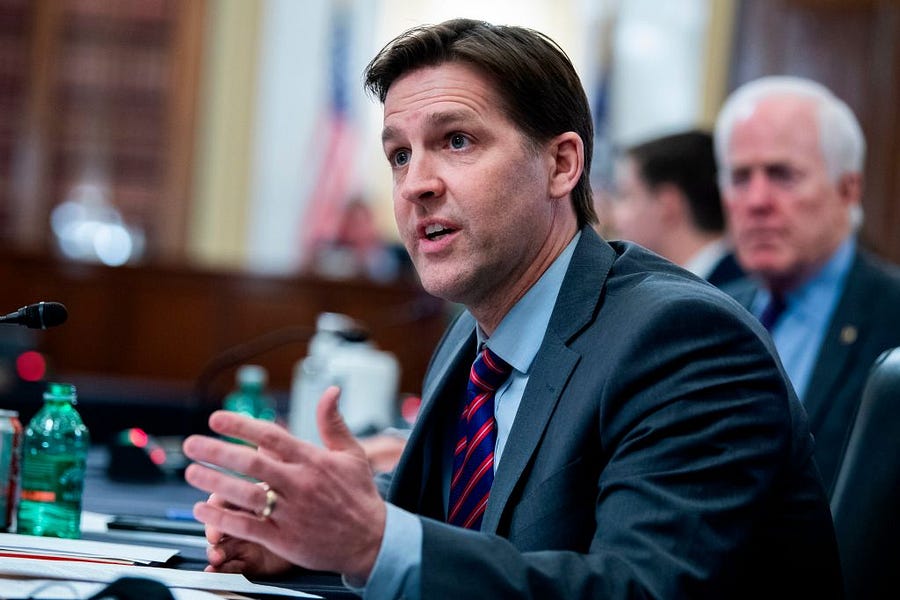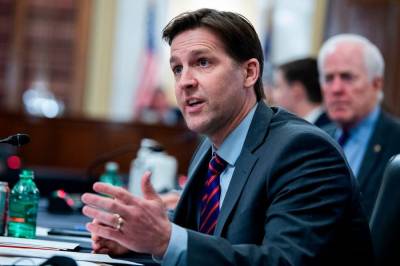Sen. Ben Sasse has excoriated the Biden administration’s mishandling of Afghanistan policy, accusing Secretary of State Antony Blinken of repeatedly misleading the public in his statements about the botched withdrawal and predicting a cascade of dire consequences for U.S. national security for years to come. In an interview with the Dispatch Podcast, Sasse described the events of the past several weeks as nothing more than “bumper sticker BS, nonsense” that has shaken the confidence of U.S. allies in the region and beyond, and said the damage has caused a “massive crisis of confidence” across the globe both “militarily and politically.”
Sasse, who sits on the Senate Select Committee on Intelligence, said White House decisionmaking was driven more by domestic politics than strategic thinking. “It’s really difficult to imagine any bigger, stupid move to shoot yourself in the foot as a global leader, and demonstrate to everybody you don’t want to be a superpower, than what Team Biden has done,” said Sasse. The implications for U.S intelligence-gathering in the country that gave birth to the 9/11 plot are profound, he added. The abrupt and total withdrawal “just cut off our own eyes and ears on the ground, where our intelligence agents were doing great, great work.”
Sasse singled out Blinken for a particularly harsh assessment of his role in the controversy, pointing to the secretary of state’s changing estimates of the Americans stranded in Afghanistan.
“Secretary [Antony] Blinken has just lied again and again and again,” Sasse said. “I don't understand why there isn’t some sense of accountability for how often Blinken just makes crap up from one press hit, to the next press hit, to the next press hit, to the next press hit. He went from saying there were 300 Americans left to 250 to 200 to 150, none of it was true. The number was never as low as 300 when they started it, there was no basis for him changing it every five minutes over the course of half an hour.”
While Sasse’s recollection of exact numbers cited by the Biden administration may not be precise, the point remains that the State Department has been unclear about how many Americans remain in Afghanistan. Sasse’s office pointed to several examples of contradictions in statements and press conferences from the State Department in the last few weeks. Most recently, White House press secretary Jen Psaki said “just under” 100 Americans were left in the war torn country, but reports have suggested that there are 143 American citizens and legal permanent residents at the Mazar-i-Sharif airport alone.
Sasse faulted both Republicans and Democrats for a dishonest discussion of the so-called “forever wars,” noting that there were choices beyond either complete withdrawal or a massive troop presence. The U.S. had largely stabilized Afghanistan with 8,000 troops, Sasse explained, before Donald Trump drew down the military presence there at the end of his presidency. Such a stabilizing force has allowed the U.S. to support the Afghan military and maintain some semblance of stability.
Further, there are American troops in many countries across the world, and that’s a good thing, Sasse said: “We have 35, 45, and 50,000 troops across South Korea, Japan, and Germany, are we today at forever wars in those places? No. We’re actually doing smart frickin’ military planning. That’s what the administration decided not to do, is have any smart military planning, and instead just cut off our own eyes and ears on the ground, where our intelligence agents were doing great, great work.”
While reiterating poor decisions in regards to Afghanistan have been made by previous administrations, Sasse argued there have been no worse decisions than the one President Biden made to completely withdraw troops. “There’s a lot of blame to go around over the course of the last 13 years, but both of the last two administrations didn’t ultimately pull the trigger to do something insanely stupid,” he said. “This guy did.”
Sasse went on to posit that the decision to leave Afghanistan was a political one and the White House is banking on Americans to eventually forget about the botched withdrawal. “There are a lot of people inside the Pentagon who fought really, really hard, and ultimately a bunch of moron political addicts at the White House decided they could just snuff out the military advice by saying ‘The American people don't have any fortitude and the attention spans will evaporate, we'll be able to manage the media cycle,’” Sasse said. “Secretary Blinken and Jen Psaki—it seems like they really believe they can just call an emergency press conference to talk about wildfires in California and Americans won’t care. We’ll just forget. We’ll go back to playing Candy Crush and getting drunk. That’s this administration’s view of the American republic.”
He warned the decision “radically” weakens the United States’ standing across the globe. Instead, pulling out of Afghanistan and leaving behind American citizens and allies strengthens China’s standing on the global stage.
He referenced something a foreign official from a NATO ally conveyed to him on a recent trip to Ukraine: “The senior European official said to me … ‘Most countries around the world are now agreeing with China that the democracies might be at the end of our history because democracies depend on shared values, and there aren’t many shared values. And it's obvious that in your country, you're not willing to fight for your values.” He said the official went on to say as much as that country wants to resist China it will not risk going to war to do it after seeing how the United States handled the withdrawal from Afghanistan.
Ultimately, Sasse thinks it is inevitable that the United States will be back in Afghanistan in some capacity in the future. “We’re going to have to make a case to the American people—hopefully before the next giant terror attack—but after the terror attacks the public’s opinion will definitely be back. So the question is, why didn’t we do the right thing to explain to the American people why an asset-light forward footprint was the most cost-effective way to defend American interests?”







Please note that we at The Dispatch hold ourselves, our work, and our commenters to a higher standard than other places on the internet. We welcome comments that foster genuine debate or discussion—including comments critical of us or our work—but responses that include ad hominem attacks on fellow Dispatch members or are intended to stoke fear and anger may be moderated.
With your membership, you only have the ability to comment on The Morning Dispatch articles. Consider upgrading to join the conversation everywhere.